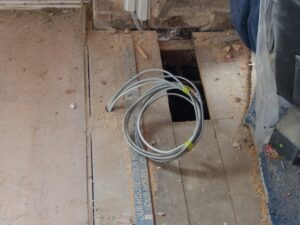Is your air conditioning system struggling to keep up?
It could be time to think about replacing the expansion valve. This small yet vital component plays a huge role in regulating the refrigerant flow, ensuring your AC stays cool and efficient.
On average, the cost to replace an expansion valve ranges from $350 to $450. But depending on factors like location, unit size, and brand, the price can vary, going as low as $100 or reaching $800.
So, why does the price range vary so much?
Well, a lot depends on the specifics of your AC system.
Whether you’re in a bustling city with a high cost of living or a more rural area, labor rates and parts can fluctuate. That’s why it’s crucial to choose a service that offers both value and quality.
And when it comes to getting the job done right, Excel Mechanical is a standout option.
Our team specializes in delivering tailored HVAC solutions designed to meet both your budget and performance needs. With our expert guidance, you’ll have peace of mind knowing your system is in great hands.
You won’t just get a fix—you’ll get long-term reliability for your AC system.
In this blog, you will learn:
- How much it costs to replace an AC expansion valve and what factors influence the price.
- Why choosing the right professionals for the job is critical for both cost-effectiveness and system performance.
- The importance of understanding the expansion valve’s role in keeping your air conditioning system efficient and running smoothly.
Understanding AC Expansion Valves
AC expansion valves might seem small and insignificant, but they are VITAL to the efficient operation of your air conditioning system.
So, what do they actually do, and why is it so important to keep them in good condition?
Role and Function
The expansion valve regulates the amount of refrigerant entering the evaporator. It adjusts based on the cooling demand of your system.
By reducing pressure in the refrigerant, it allows it to expand and cool efficiently. This process is important because it maintains a stable temperature indoors.
A well-functioning valve ensures that your air conditioning system runs smoothly and efficiently, preventing potential damage or inefficiency. Understanding this role helps recognize when something might be off.
Types of Expansion Valves
There are two common types of expansion valves:
- Thermostatic Expansion Valves (TXVs): These are the most widely used, as they can adjust refrigerant flow based on changes in temperature. They offer accuracy and efficiency, ensuring your AC system works at its best.
- Fixed Orifice Valves: These are simpler and cheaper. However, they don’t adjust based on temperature, meaning they provide a constant refrigerant flow. While they might work under some circumstances, they aren’t as adaptable as TXVs.
Choosing the right valve for your system is important because it affects not just your AC’s performance, but its lifespan. For instance, if you’re installing a valve that’s not suited to your system’s needs, you could face cooling inefficiency and higher energy bills in the long run.
Signs of Expansion Valve Failure
A faulty expansion valve can cause various problems in your AC system.
Common signs include:
- Inconsistent cooling: Are certain rooms hotter than others, even though the AC is on full blast? That could be a sign of refrigerant flow issues caused by a faulty valve.
- Frost on the evaporator coil: If you spot frost or ice forming around the coils, it might be because the valve is malfunctioning, preventing the refrigerant from expanding properly.
- Unusual hissing noises: Ever heard hissing sounds coming from your unit? That could indicate a refrigerant leak or improper flow through the expansion valve.
By addressing these problems quickly, you can avoid further damage to your AC system and keep things running smoothly for longer.
Factors Affecting Replacement Cost
When it comes to replacing your AC expansion valve, it’s not just a matter of picking the part and calling it a day. Several factors can affect how much you’ll end up paying for this repair.
Knowing these factors can help you better plan for the cost and prevent any surprises.
Vehicle Make and Model
The make and model of your vehicle significantly impact the replacement cost of the expansion valve. Luxury and high-performance vehicles often require specialized parts that can be more expensive.
Additionally, the complexity of accessing the valve varies with different vehicle designs, affecting labor time and cost. Older models might also present challenges if parts are less readily available, potentially increasing the total cost.
Expansion Valve Type
The type of expansion valve required can affect both the parts and labor involved in the replacement.
Different vehicles use various types of valves, such as thermal expansion valves (TXVs) or fixed orifice tubes, each with distinct characteristics and costs.
Choosing the right valve for your system ensures efficiency and reliability, impacting both initial costs and long-term performance.
Labor Costs
Labor costs are a significant part of the replacement expense. These can vary based on the mechanic or service provider you choose.
Some providers might charge higher rates due to their expertise and speed. We at Excel Mechanical offer competitive pricing and quality service, ensuring your replacement is performed by skilled professionals who understand HVAC and plumbing systems inside and out.
Geographical Location
Your geographical location also plays a role in the overall replacement cost.
Prices for parts and labor can vary widely in different regions. Urban areas sometimes have higher costs due to demand and overheads.
In contrast, rural areas may offer lower prices but might also have fewer service providers.
Understanding these regional differences can help you make informed decisions.
Cost Estimates for Replacement
When you start looking at the cost of replacing an AC expansion valve, you might notice a wide range of prices.
It’s natural to wonder: Why such a big difference?
Understanding these price differences can help you make an informed decision about how to move forward with your repair.
Let’s break down the main factors that contribute to the cost of replacing this important part of your system.
Average Cost Range
The cost of replacing an AC expansion valve can differ significantly.
Prices typically range from $185 to $1,200, depending on several factors like location and service provider.
A general estimate is often between $335 and $750.
Remember, costs may also include labor and other related repairs, so it’s essential to get a comprehensive quote.
OEM Parts vs. Aftermarket
When it comes to choosing parts, you have two main options: OEM (Original Equipment Manufacturer) and aftermarket.
OEM parts are original and generally more expensive because they are made by the AC’s original manufacturer, ensuring a perfect fit and compatibility.
On the other hand, aftermarket parts can be cheaper and offer more variety.
While these parts might lack manufacturer assurance, they can still work effectively if chosen wisely.
Replacement Process Overview
When it’s time to replace the AC expansion valve, the process involves more than just swapping out a part.
So, what does this replacement really entail?
Understanding the full scope of the replacement process ensures that you’re well-prepared for what’s ahead.
It starts with identifying the problem, continues with the replacement, and ends with thorough testing to make sure everything is running smoothly.
Let’s find out!
Initial Diagnosis
The process starts by determining if the expansion valve is the problem.
Common signs include a loss of cooling, uneven temperatures, or unusual noises. You might notice ice forming on the coils.
Technicians use specialized tools to check the pressure and temperature levels in your system.
Effective diagnosis ensures that you’re not replacing parts unnecessarily.
Accurate identification of the issue can save you time and money down the line. Be sure to consult with experts who understand your specific HVAC model and can offer precise diagnostics.
Step-by-Step Replacement
Once the diagnosis confirms the need for replacement, the actual work begins.
- First, the power to the unit must be completely shut off to ensure safety.
- Next, technicians will recover the refrigerant from the system safely, as releasing it can be harmful to the environment.
- After that, the faulty valve is removed, and a new one is installed with precision. This involves making sure all connections are sealed properly to prevent leaks.
At each step, technicians ensure that the installation aligns with the manufacturer’s specifications. Excel Mechanical takes pride in performing these replacements with exceptional quality, catering to your individual needs and budget.
Post-Replacement Testing
The final stage involves testing the unit after the new expansion valve is installed.
The system is recharged with refrigerant, and technicians check for leaks and proper operation. This includes monitoring the system pressure and ensuring the cooling is restored to the desired level.
Post-replacement testing is crucial, as it confirms that the AC unit is functioning optimally and efficiently. Any anomalies detected can be addressed immediately.
This thorough testing process ensures that you can rely on your air conditioner for consistent comfort.
Potential Additional Repairs
While replacing the AC expansion valve is often necessary, it’s not always the only repair needed.
Could there be other hidden issues in your system that might need attention?
Sometimes, during the process of replacing the expansion valve, technicians may uncover other problems that could affect your AC’s performance.
Compressor Issues
The compressor is another critical component in your AC system, responsible for circulating refrigerant throughout the unit.
If it’s not functioning properly, even a newly replaced expansion valve might not get your system running efficiently.
How do you know if the compressor needs attention?
- Unusual noises coming from the compressor can be a red flag. This could indicate internal damage or wear.
- Higher energy bills can also signal that the compressor isn’t working as efficiently as it should be, causing your system to work harder than necessary.
Over time, compressors can wear out, especially if the system is old or hasn’t been properly maintained. If your technician suspects compressor issues, they may recommend replacing it.
However, this can be a more expensive fix, so it’s essential to weigh the costs carefully.
Refrigerant Leaks
Refrigerant leaks are another common issue that can arise during valve replacement.
These leaks can lead to reduced cooling efficiency and put extra stress on the compressor.
A leak might be noticeable by hissing sounds or reduced cooling output. Early detection is key, as prolonged leaks might cause environmental harm and increased utility bills.
Conducting comprehensive checks can help locate and fix leaks promptly.
Our team at Excel Mechanical is skilled in identifying and resolving such issues, ensuring your system returns to optimal functioning with minimal environmental impact.
Electrical System Checks
AC units rely heavily on a robust electrical system to function properly.
Electrical issues can cause erratic system performance or complete shutdowns.
Faulty wiring or broken components need inspection during any major repair.
This helps prevent further damage or unsafe conditions.
A thorough electrical checkup ensures all components work harmoniously, maximizing the lifespan of your system.
This guarantees your unit operates safely and efficiently, catering to your specific needs and delivering excellent value.
Preventive Maintenance Tips
We all know that prevention is better than cure, right?
When it comes to your AC, keeping things running smoothly before a major issue arises can save you both time and money.
But what can you do to keep your AC in top condition without constantly worrying about breakdowns?
Here are some straightforward tips to help you with maintenance.
- Schedule Regular Inspections: Arrange for bi-annual inspections to identify potential issues before they become major problems. This helps in maintaining the longevity and efficiency of your system.
- Keep the System Clean: Make sure the coils and filters are clean. Dust and debris can restrict airflow, causing the system to work harder and possibly leading to valve issues.
- Check for Leaks: Regularly inspect the system for refrigerant leaks. Low refrigerant levels can affect the expansion valve’s performance, so prompt detection and repair are essential.
- Monitor System Performance: Pay attention to any unusual noises or changes in cooling efficiency. Early detection of problems can prevent further damage.
- Use Professional Services: Choose Excel Mechanical for your HVAC needs. Our team provides thorough inspections and maintenance services to ensure your system runs smoothly. We deliver exceptional quality and great value.
- Maintain Optimal Temperature Settings: Set your thermostat to a reasonable temperature to avoid overworking the system. This reduces stress on the expansion valve and other components.
Warranty and Insurance Considerations
We’ve all been there—your AC starts acting up, and you start to wonder, “Am I covered?”
Well, when it comes to replacing an AC expansion valve, knowing your warranty and insurance options can give you peace of mind.
But how do these affect your costs and what should you be aware of?
Let’s find out!
1. Understanding Your Warranty
Warranties are designed to protect you, but they often come with a few conditions. What exactly does a warranty cover? Typically, a warranty will cover defects in materials or workmanship for a set period—usually 1 to 5 years. However, you need to ensure the warranty is still valid and covers the specific repair you need.
For example, if your AC unit is still under warranty, replacement parts like the expansion valve might be covered at no cost to you.
But here’s the catch: regular maintenance is key to keeping the warranty intact. If you neglect proper care, you could find yourself without coverage when you need it most. So, why not take advantage of regular maintenance to keep that warranty valid?
2. Insurance Coverage for AC Repairs
Insurance can also help protect you, especially if an unforeseen issue arises.
Does your homeowner’s insurance cover AC repairs?
Some policies include HVAC coverage, but it’s not guaranteed.
You’ll want to verify with your insurance provider to determine if AC repairs, including expansion valve replacements, are covered. This can help you save on out-of-pocket costs.
In the case of unexpected damage—such as from a power surge or storm—your homeowner’s insurance may cover the repair costs, including parts and labor. But if the damage is due to regular wear and tear?
That’s where your warranty and maintenance routine comes in.
3. Combining Warranty and Insurance
Imagine this: Your expansion valve fails, and you find out that both your warranty and insurance will cover different aspects of the repair.
What a relief!
If your AC unit is under warranty, the replacement part might be covered. Meanwhile, your insurance could cover labor costs or unexpected damage.
The key to combining these benefits is making sure that you’re well-informed about both.
Have you ever considered checking both options at the same time?
Knowing what’s covered and by whom helps you make the best financial decisions and avoids unnecessary surprises.
4. Protecting Your Investment
Your AC system is a big investment—especially if you’re dealing with expensive parts like the expansion valve.
Understanding how warranties and insurance can protect you not only saves you money but also ensures that your system continues to perform at its best for years to come.
What if a small investment in insurance or a warranty could save you thousands down the line?
By taking the time to understand the fine print of your warranty and insurance, you’re setting yourself up for smoother repairs and greater confidence when something goes wrong.
Frequently Asked Questions
When it comes to AC expansion valve replacement, there’s often a lot to consider.
You might have some questions running through your mind, like: How much is this going to cost?
How do I know if it’s the valve causing the problem?
How long will it take to fix?
Well, we’re here to answer these common questions so you can feel confident in your next steps.
How much should I expect to pay for a car AC expansion valve replacement?
The cost of replacing a car AC expansion valve often ranges from $350 to $450, depending on your vehicle’s make and model. This includes both parts and labor costs.
What is the cost range for replacing a central air conditioning expansion valve?
For central air systems, the cost to replace an AC expansion valve typically runs between $250 and $470. The total expense might vary based on the system’s size and complexity.
What are the indications of a malfunctioning AC expansion valve?
Signs of a faulty AC expansion valve include uneven cooling, frost buildup on the evaporator, or hissing noises. If you notice these issues, it might be time to consider replacement.
What is the estimated service life of an AC expansion valve?
An AC expansion valve usually lasts around 10 to 15 years. Routine maintenance and timely repairs can help extend its lifespan and improve system efficiency.
How long does the process of replacing an AC expansion valve typically take?
The replacement of an AC expansion valve generally takes between two to four hours. This time can vary based on the system’s complexity and any additional repairs needed.
Does the make and model of a vehicle affect the cost of replacing its AC expansion valve?
Yes, the make and model of your vehicle can influence the cost. Some brands have more expensive parts, and the labor required may vary. For accurate estimates, reaching out to a professional is advised.
In need of HVAC services?
Excel Mechanical offers top-notch solutions tailored to your needs and budget. Our team is dedicated to delivering exceptional value with every project. Whether for residential or commercial settings, we ensure the best service possible.




